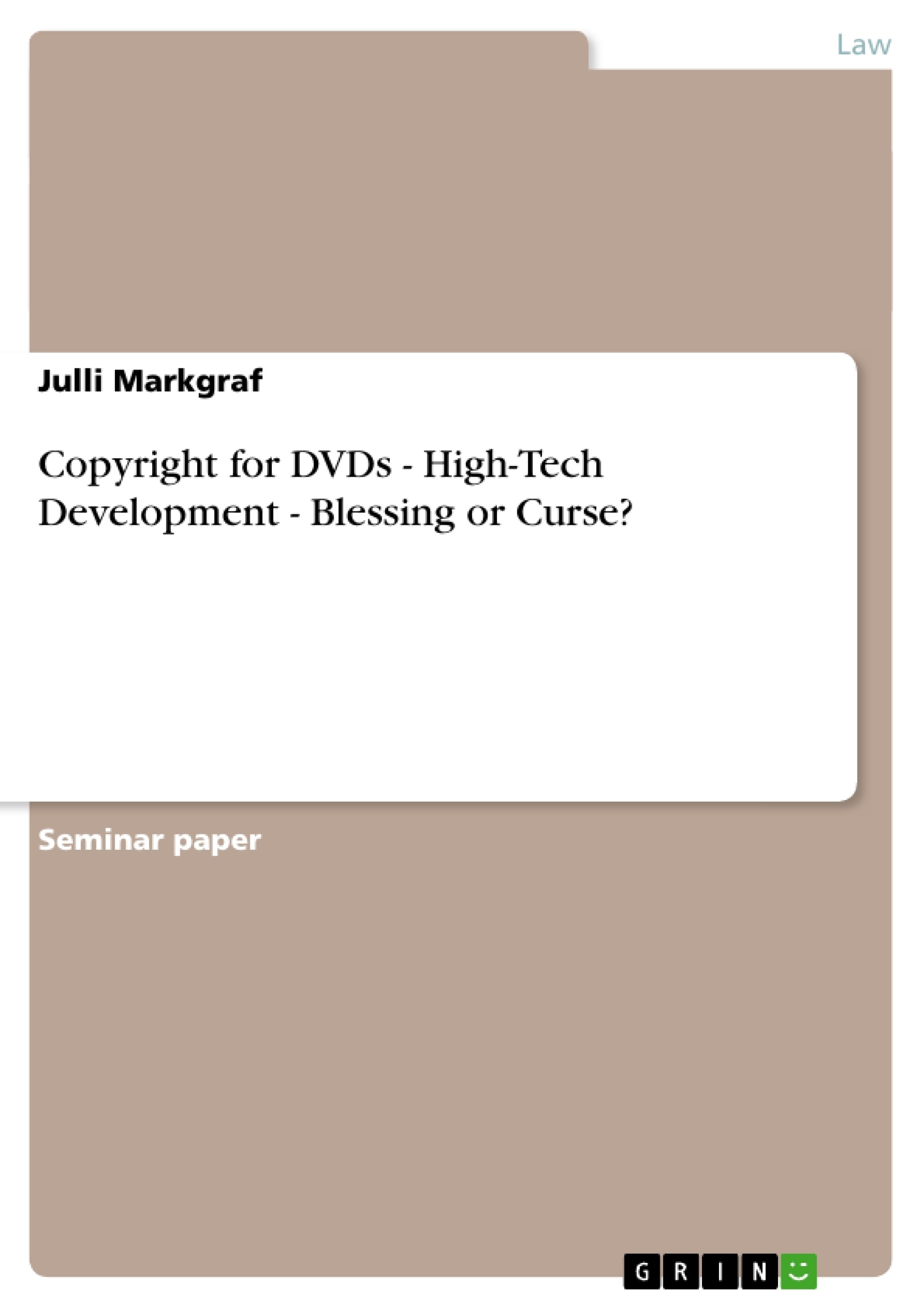Following up the last mentioned development, the copyright of DVD’s and
the protective sanctions, which the copyright owners of the film industry
imposed, will be the central focus of the assignment. However, the paper will
not address the issue of downloading film data from the Internet. For the
purpose of that paper, the question of backing up purchased DVD’s will be
the major focus.
Under the Copyright Act 1968 (Cth), film is defined under secondary work. In
order to distinguish works from secondary works, the Copyright Act 1968
defines “protection of forms of expression that are artistic, literary, dramatic
and musical items”4 as works, whereas mechanical rights, “such as films,
sound recordings, television broadcasts and published editions”5 are defined
as secondary work. The reason for that differentiation is that secondary work
is generally based on a work. However, the copyrights exist independent of
each other simultaneously.6
Furthermore, “film is defined as the aggregate of visual images capable of
being shown as a moving picture, including the soundtrack.”7 This also
includes movies which are made by computer animation, such as Finding
Nemo for example. Moreover, even interactive video games fall under the
definition of film since the decision of Saga Enterprises LTD v Galaxy
Electronics Pty Ltd (1997) 147 ALR 2. However, the paper will not deal with
cinematographic films defined under that case (interactive games) but will
only focus on movies in a classical understanding.
As previously mentioned, the film industry developed several protective
strategies, which were supposed to resist against copyright piracy. However,
the copyright owners had to face several bitter discomfitures. A 15-year-old
Norwegian used basic mathematic formulas and cracked the protective code.
New high-tech technology offers devices for easy DVD copying of already
purchased products. The segmentation of the market in several area codes is
facing the test of the infringement of competition law. Also subject to the
question of competition law was the question dealt with in the Australian
case Australian Video Retailers Association Ltd v Warner Home Video Pty Ltd
[2001] FCA 1719, where Australian Video Retailers refused to accept the
Warners approach of introducing two different DVD types on the market, one
for retail and one for rental.[...]
4 Quirk, P., Forder, J., Electronic Commerce and The Law, p. 181.
5 s. above, p. 181.
6 s. above, p. 181.
7 s. above, p. 187.
Inhaltsverzeichnis (Table of Contents)
- Introduction
- Abstract
- Objective of the Paper
- Procedure of Analysis
- Movie Protection
- The Copyright Owners Preventive Strategy
- The Great Cases of "DVD Jon" and Others
- Copying DVD's and Digital Devices for Backing up – legal or illegal?
- Is a DVD a Software?
- The Moral Battle
- MPAA
- EFF
- Conclusion
Zielsetzung und Themenschwerpunkte (Objectives and Key Themes)
This paper examines the current state of copyright law as it applies to DVDs, particularly focusing on the film industry's efforts to protect their copyrights. The paper uses case studies from both the United States and Australia to illustrate the challenges and protective measures taken by the film industry. It also explores the moral implications and opposing viewpoints of copyright users and owners.
- Copyright protection of DVDs in the film industry
- The impact of new technologies on copyright infringement
- The legal and ethical issues surrounding copying DVDs for personal use
- The role of copyright owners and users in protecting intellectual property
- The impact of copyright law on competition and consumer rights
Zusammenfassung der Kapitel (Chapter Summaries)
- Introduction: This chapter introduces the topic of copyright law as it relates to DVDs, specifically focusing on the film industry's struggle with piracy. It highlights the challenges posed by new technologies and the need for effective protection measures.
- Movie Protection: This chapter examines the strategies employed by copyright owners to prevent piracy of DVDs. It delves into specific cases of infringement, including the "DVD Jon" case, and discusses the legal and ethical issues surrounding copying DVDs for backup purposes. The chapter also explores the debate over whether DVDs should be classified as software.
- The Moral Battle: This chapter focuses on the ethical and moral dimensions of copyright law, highlighting the opposing viewpoints of copyright owners and users. It examines the role of organizations like the MPAA and the EFF in advocating for their respective positions.
Schlüsselwörter (Keywords)
The key topics and terms explored in this paper include copyright law, digital versatile discs (DVDs), film industry, piracy, copyright protection, fair dealing, fair use, digital rights management (DRM), technological advancements, moral rights, MPAA, EFF, and legal case studies.
Frequently Asked Questions
Is it legal to back up a purchased DVD?
The paper examines the legal complexities under the Copyright Act 1968 and international laws regarding personal backup copies and anti-circumvention measures.
What is the "DVD Jon" case?
It refers to a 15-year-old Norwegian who cracked the protective code of DVDs using basic math, sparking a major legal and ethical battle in the film industry.
How does copyright law distinguish between works and secondary works?
Artistic and musical items are defined as "works," while films and sound recordings are "secondary works" based on original expressions.
What are the roles of the MPAA and the EFF?
The MPAA represents copyright owners' interests, while the EFF (Electronic Frontier Foundation) often advocates for consumer rights and fair use.
Does a DVD count as software under copyright law?
The paper explores the debate and legal cases regarding whether DVDs and interactive video games should be classified as cinematographic films or software.
- Arbeit zitieren
- Julli Markgraf (Autor:in), 2003, Copyright for DVDs - High-Tech Development - Blessing or Curse?, München, GRIN Verlag, https://www.grin.com/document/22518



